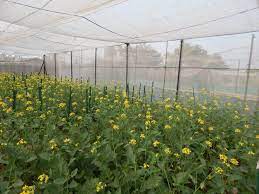Gene-edited Mustard:

Indian scientists developed the first ever Gene edited low-pungent mustard that is pest and disease-resistant.
- Gene-edited Mustard is India’s most significant domestically-grown oilseed is rapeseed-mustard.
- Mustard seeds have high levels of glucosinolates, a group of sulphur and nitrogen-containing compounds contributing to the characteristic pungency of their oil and meal.
- Rapeseed meal is unpalatable to poultry and pigs, while having to be mixed with fodder grass and water for giving to cattle and buffaloes.
- Besides reducing their feed intake, high glucosinolates are also known to cause goiter (swelling of neck) and internal organ abnormalities in livestock.
- The dry seeds from the normal mustard (Brassica juncea) cultivated in India contain 120-130 parts per million (ppm or mg/kg) of glucosinolates.
- This is as against the sub-30 ppm levels in canola seeds.




